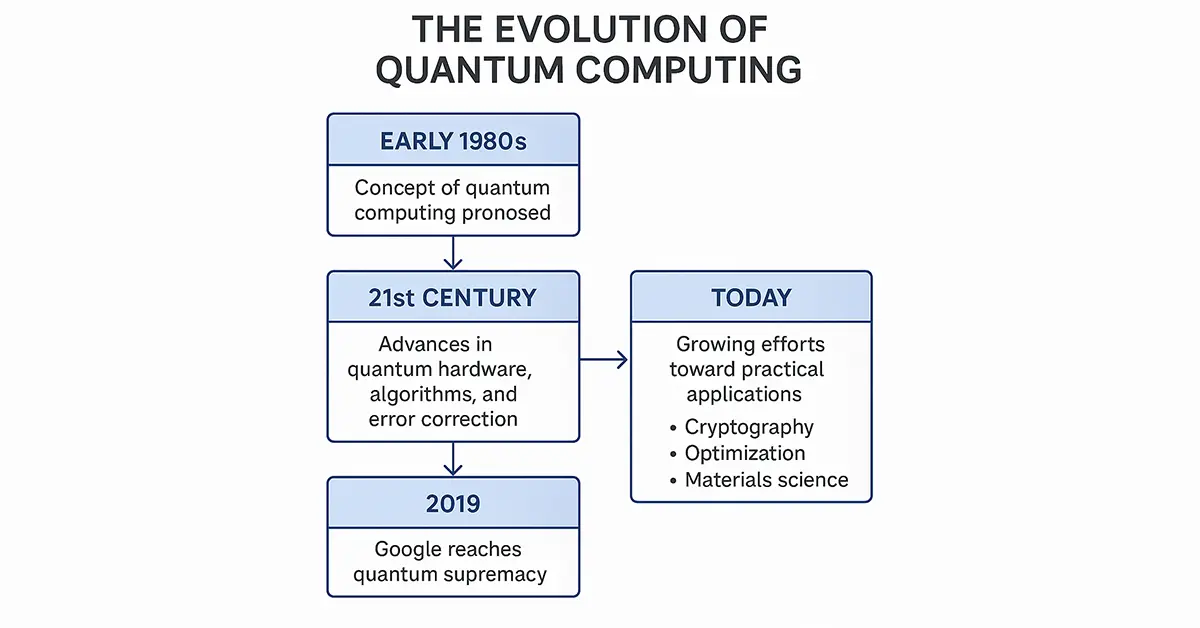
What if the computer of the future could help alleviate some of the problems facing us today in seconds? It would take a traditional computer millions of years. That is what quantum computing promises to deliver: a revolution that can revolutionize all the sectors it comes into contact with. From science and medicine to finance and cybersecurity, quantum computing is spearheading the next technology revolution.
This article explores the fundamentals, current progress, and real-world applications of this innovation. We’ll uncover how it’s changing the rules of computation and setting the stage for a faster, smarter, and more efficient future.
Understanding Quantum Computing
Scientists have rebranded how computers calculate information by producing qubits, unbound by the binary constraints of traditional bits. Unlike traditional bits, which are 0 or 1, qubits can appear everywhere in a quantum superposition due to superposition and entanglement. This allows machines to solve several calculations at once, not one after the other, significantly heightening their ability to solve certain problems.
By superposition, the engineers enable a qubit to hold more than one state. By entanglement, they connect qubits in a way that a manipulation of one immediately affects the rest no matter where they are physically located. These operations permit quantum computing-based systems to be superior to classical systems in cryptography, molecular modeling, and optimization of data. As researchers improve the stability of qubits and system precision, they are bringing us closer to a solution deemed intractable.
The Evolution of Quantum Computing

Back in the early 1980s, physicists such as Richard Feynman talked about using quantum mechanics for computing. It took scientists several decades to work on the idea, but the technology was not ready yet to make it a reality. During the 21st century, scientists and engineers started surmounting such challenges by improving quantum hardware, sophisticated algorithms, and superior error correction methods.
In the past two years, companies such as IBM, Google, Intel, Rigetti and IonQ have invested a lot in creating reliable and large quantum machines. In 2019, Google achieved quantum supremacy when its machine solved an exact problem in just three minutes, while the fastest standard computer would have taken many days to do this.
Today, this rivalry continues intensifying with groups pushing the limits of innovation. What they do lays the foundation for a future when quantum computing upends areas such as cryptography, optimization, and materials science.
Quantum Computers in Practice
Quantum computers are starting to surpass themselves in real, applied applications in numerous sectors. In medicine, they are utilized by researchers to model and simulate intricate molecular interactions, which accelerate the discovery of new drugs and decrease costs of development. Crunching computations, slowing down traditional machines, quantum computers enable scientists to simulate compounds virtually before proceeding to actual experiments.
Logistics engineers use quantum-inspired techniques to tackle routing optimization, inventory optimization, and supply chain optimization. These systems are efficient at solving complex combinatorial problems at unparalleled speeds, enabling firms to save time and money.
Quantum algorithms are employed by financial companies to better model risk scenarios and identify fraud more appropriately. These innovations assist decision-making and possess a greater security feature.
Data scientists also incorporate quantum systems in machine learning pipelines, which reduces the time to train large models. Meteorologists look forward to more accurate weather predictions by more accurately modeling atmospheric systems. Cryptography and materials science advances also continue.
With quantum computing continuing to advance at a tremendous pace, its application is beginning to leave theory behind and head towards transformational uses. With more organizations turning to technology, quantum computers will help solve some of the globe’s most complicated and most critical challenges.
Quantum Algorithms: Solving the Unsolvable
Quantum algorithms propel the transformative potential of computation to be. Computer scientists and mathematicians created the algorithms to bypass challenges that in essence are insurmountable for traditional systems. Shor’s algorithm, for instance, breaks large numbers exponentially more quickly than any standard process — a development that threatens modern-day encryption standards. Security professionals everywhere now reassess cryptography systems in preparation for such disruptive capacity.
Grover’s algorithm optimizes searching by greatly decreasing the amount of time needed to find a particular item within unordered databases. Rather than going through each entry individually, Grover’s algorithm enables users to learn outcomes with considerably fewer steps, providing a quadratic speedup.
In contrast to conventional algorithms that simulate existing computing paradigms, quantum algorithms rework problem-solving solutions altogether. They function on new foundations of principles, using entanglement and superposition to produce outcomes that are outside classical bounds. Designers must now work on creating new logic and architecture that leverages this style of computing.
Instead of just extending the capacity to compute, quantum computing…
Comments
Post a Comment